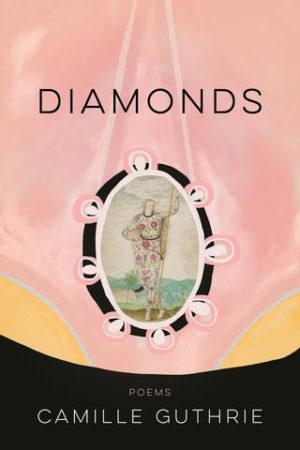Diamonds
by Camille Guthrie
reviewed by Adam Scheffler
Camille Guthrie’s fourth book Diamonds begins in hell, but only the second circle: “Virgil, hey! Send me down / To the second circle of hell where I belong / With those whom Love separated from Reason … ” The love she speaks of is that of a single, middle-aged, divorced mother of two doing her best, but at her wits’ end as her children “stab holes in [the] bedroom wall,” “complain,” “howl,” write “‘No Mom’ on her door with a Sharpie,” and exclaim “‘No fence but you’re kinda fat.’” In other words, it’s a hell that’s hilarious (and Guthrie is a very funny poet)—but hers is the sort of hilarity that’s on the edge of tears, conveying just how draining being a single parent can be. We believe, and are moved by, the speaker’s unsentimental honesty when she says that she’d prefer to be “blasted” by “an infernal hurricane [ … ] Hither & thither” than to “suffer forever with the other mothers.”
But this is only the second circle of hell, and Guthrie is keenly aware of how much more painful and wretched life can be. Guthrie’s speakers describe being lovelorn, lonely, aging, financially insecure, and stretched thin—and long for the collection’s titular “diamonds,” which stand for a kind of transcendence, or at least a life less harried and lonely. Writing of the “tender disgruntledness” of Rembrandt’s Man Reading, Guthrie remarks, “To me he says that life is utterly disappointing / Even if you are fucking Rembrandt.” And yet, Guthrie also mocks and satirizes her own laments (“Ah me! I find myself middle-aged divorced lost / In the forest dark of my failures mortgage & slack breasts”), and constantly reminds herself of how “I’m not floating on a raft to escape war / not having sex with soldiers for food / my children are not digging for diamonds [ … ] ‘Could Be Worse!’ is a book we love to read.”
This move doesn’t feel like a pro forma “privilege check,” but rather a serious attempt at emotional honesty about life’s disappointments and unfulfilled longings, while also correcting one’s tendencies towards self-indulgence. The “could be worse” reminder takes part in the collection’s broader, heroic attempt to make life less dreary—to infuse it with more delight and pleasure—by taking stock of how much one has. In “During the Middle Ages,” for example, Guthrie rebukes her speaker’s laments on becoming middle-aged by imagining what it must have been like to live during the historical Middle Ages, where: “Some shithead priest threatens you with hell / To pocket your last coin and there’s no Tylenol / So you have to suck on some skullcap seeds / And knights canter about knocking you down.” Living in the Middle Ages of history, “it’ll be a very long time before Pop Art / And meerkat videos and cotton candy / And sexting and fish tacos and girl bands / Everything’s just so bad and you have buboes.”
These lists, which crop up everywhere in Diamonds, are characteristic of the collection in that, even when they’re comprised of painful experiences, they’re often hilarious and full of zany imaginative verve. Strangely, we end up feeling as much pleasure reading about “some jerk recit[ing] / The latest by Wulfstan the Cantor / Right before he beheads your uncles” as we do in reading the list of modern marvels (Pop Art, meerkat videos, girl bands); the former is wonderfully imaginative despite, and indeed through, its darkness. Or take the poem “My Net Worth,” which is, in its entirety, a long list of the speaker’s “possessions,” which include:
Fantasies of being friends with Roland Barthes and Joan Jett [ … ]
Debt to my parents mostly emotional
No savings, no loans, no liens [ … ]
A worthless wedding ring [ … ]
Two unicorn tattoos, temporary [ … ]
Many girlfriends available 24/7 for complaining [ … ]
A battered unrealistically hopeful heart [ … ]
Though this list includes disappointment and heartbreak (the debt, the wedding ring, the lack of savings), its wild juxtapositions, humor, and surprising specifics (unicorn tattoos, Joan Jett, liens), along with its propulsive capitalized lines, ultimately create that sense of energetic, “battered hopefulness.”
Despite starting in hell, and despite its commitment to clear-eyed description of disappointments and trials, Diamonds demonstrates how poetry can be a partial antidote to life’s bitterness—for both writer and reader. This works best when Guthrie’s zany bravura and imaginative listing, her playfulness and wit, are brought to bear on the issues most troubling to her, which include—in addition to the challenges of being a financially insecure single parent—society’s “brute indifference” towards poetry; romantic love’s delights and letdowns; horrific current events (“sea level rises” and “ruthless ideologies”); the impossibility of transcendence; and gender trouble (the book is delightfully feminist through and through).
Of course, poetry—and art—cannot solve these problems, or even inoculate us against despair when we have a particularly bad day, and Guthrie does not pretend that they can. (Indeed, her poems sometimes end with the sad sense of breaking the spell, of being forced back to where “We have serious work to do” and “the real prevails.”) But, as Diamonds demonstrates, poetry can offer us some relief, delight, and wisdom—here served up with swagger and outrageous inventiveness. For whether it’s in “Virgil, Hey,” or “My Boyfriend, John Keats,” or “Diamonds,” which begins with the line “Judith Butler, I am calling you out,” Guthrie playfully engages with serious writers and thinkers in addresses that are both colloquial and learned. Her list poems are as likely to include Rihanna as Hieronymus Bosch, Bjork as a female Pict warrior, sex fantasies as much as art, and laughter as often as sorrow. These poems don’t offer the escapist entertainment so readily available everywhere, but instead that rare thing for which we turn to poetry in particular: making, if only in the second circle, a heaven of hell.
Published on December 3, 2021

